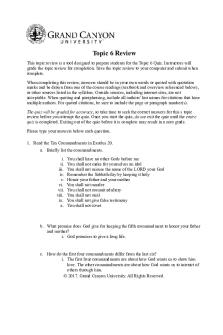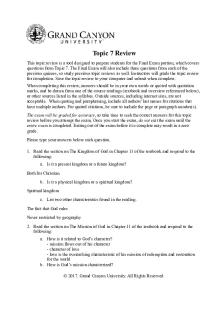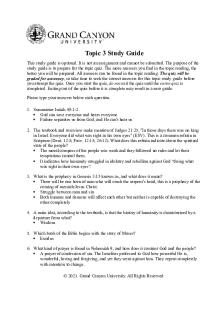CWV 101 RS T6Review Online PDF

| Title | CWV 101 RS T6Review Online |
|---|---|
| Course | Christian Worldview |
| Institution | Grand Canyon University |
| Pages | 4 |
| File Size | 165 KB |
| File Type | |
| Total Downloads | 78 |
| Total Views | 147 |
Summary
Download CWV 101 RS T6Review Online PDF
Description
Topic 6 Review This topic review is a tool designed to prepare students for the Topic 6 Quiz. Instructors will grade the topic review for completion. Save the topic review to your computer and submit when complete. When completing this review, answers should be in your own words or quoted with quotation marks, and be drawn from one of the course readings (textbook and lecture referenced below), or other sources listed in the syllabus. Outside sources, including internet sites, are not acceptable. When quoting and paraphrasing, include all authors' last names for citations that have multiple authors. For quoted citations, be sure to include the page or paragraph number(s). The quiz will be graded for accuracy, so take time to seek the correct answers for this topic review before you attempt the quiz. Once you start the quiz, do not exit the quiz until the entire quiz is completed. Exiting out of the quiz before it is complete may result in a zero grade. Please type your answers below each question. 1. Read the Ten Commandments in Exodus 20. a. Briefly list the commandments. 1 – No other god’s other than God himself. 2 – Obey my commandments. 3 – Do not use the name of God in vain. 4 – Do not work on the Sabbath, keep it holy. 5 – Honor your father and mother, 6 – Do not murder anyone. 7 – Do not commit adultery. 8 – Do not steal. 9 – Do not lie to your neighbors. 10 – Do not desirous your neighbor’s things. b. How do the first four commandments differ from the last six? The first four commandments are about God. I think because God is the first commandments to worry about keeping. 2. Read the Beatitudes, the blessings of Jesus in the opening verses of the Sermon on the Mount in Matthew chapter 5:1-12. Which one is repeated and emphasized? Those who suffer and are meek will inherit the earth.
© 2017. Grand Canyon University. All Rights Reserved.
3. From the lecture, what two commandments did Jesus say are the greatest? Love your neighbor as you love yourself. Love your God with all your heart and with all your soul. 4. From the lecture and textbook, write out the short quote that philosopher Friedrich Nietzsche made famous about truth. “There is no truth, only interpretations.” 5. From the textbook, describe how Raphael, in his great painting School of Athens, depicted Plato and Aristotle. Plato and Aristotle are in the front. Plato’s ultimate truth can be applied to mankind regardless of the context relating to understanding of God. Aristotle is perceptive to the truth though observing interaction. 6. According to the lecture, what kind of absolute truths require the existence of God? Without God there would be no moral or spiritual truths. 7. Briefly define general and special revelation. General Revelation – How God reveals himself through his creation. Throughout history and natural laws that are proved through science. Special Revelation – How God reveals himself to humanity so they can share what he made known to others. Ways of sharing include scripture and a personal relationship with Jesus. 8. From Chapter 8 of the textbook, define Exclusivism and pluralism. Exclusivism – the concept that there is only one way to God through Jesus. Pluralism – the concept that all religions hold a piece of the puzzle. 9. According to Chapter 9 in the textbook, does Job ever find out why he suffered? What is the best explanation from our perspective? Job did not ever find out why he suffered. Job stayed faithful to God, and kept believing in God and his plan for his life. Job shows us that life is not always good, but if we keep our faith in God then everything will turn out right in the end.
2
10. Read the story of the raising of Lazarus in John 11. What can we learn about Jesus and death from this account of the event? If we have faith Jesus can get us through anything. We will ultimately be raised from the dead when we get to heaven.
11. Read the 11 reasons for suffering listed in the lecture. Which reason(s) might provide good cause for a Christian to “count it all joy” as James says to do in James 1:2-4?
Suffering strengths your character. Suffering reminds us that we need God, and brings us closer to God. Suffering increases our ability to show compassion for others.
12. Read the section on theodicy in Chapter 9 of the textbook. a. Define theodicy – “The Christian defense of God’s infinite goodness and power despite the presence of evil and suffering.”
b. What are two explanations Christians might give to explain the problem of evil—how a good and powerful God would allow suffering? If we do not experience suffering then we will never truly understand the unconditional love of God. Without us suffering we would not understand the suffering that Jesus went through for us.
13. According to Philippians 2:1-11, how are Christians to behave in light of what Jesus endured? Christians should put others before themselves, and be humble and obedient just like Jesus. We are to worship and give glory to God.
3
References Jibben, J. (2015). The wisdom of absolutes. In Grand Canyon University (Ed.), The beginning of wisdom: An introduction to Christian thought and life (2nd ed.). Available from http://gcumedia.com/digital-resources/grand-canyon-university/2015/the-beginning-ofwisdom_an-introduction-to-christian-thought-and-life_ebook_2e.php Lecture 6. (2017). CWV-101: Christian Worldview. Phoenix, AZ: Grand Canyon University. Sharpe, J. (2015). Experiential obstacles to wisdom. In Grand Canyon University (Ed.), The beginning of wisdom: An introduction to Christian thought and life (2nd ed.). Available from http://gcumedia.com/digital-resources/grand-canyon-university/2015/the-beginning-ofwisdom_an-introduction-to-christian-thought-and-life_ebook_2e.php
© 2017. Grand Canyon University. All Rights Reserved....
Similar Free PDFs

CWV 101 RS T6Review Online
- 4 Pages

CWV 101 RS T6Review Online
- 4 Pages

CWV 301 RS T6Review Online
- 4 Pages

CWV 101 RS T1Review Online
- 4 Pages

CWV 101 RS T7Review Online
- 3 Pages

CWV 101 RS T1Review Online
- 4 Pages

CWV 101 RS T3Review Online
- 4 Pages

CWV 101 RS T7Review Online
- 4 Pages

CWV-101-RS-T2Review-Online
- 4 Pages

CWV 101 RS T2Review Online
- 4 Pages

CWV-101-RS-T1Review-Online
- 3 Pages

CWV 101 RS T2Review Online
- 4 Pages

CWV 101 RS T5Review Online
- 3 Pages

CWV 101 RS T7Review Online
- 4 Pages
Popular Institutions
- Tinajero National High School - Annex
- Politeknik Caltex Riau
- Yokohama City University
- SGT University
- University of Al-Qadisiyah
- Divine Word College of Vigan
- Techniek College Rotterdam
- Universidade de Santiago
- Universiti Teknologi MARA Cawangan Johor Kampus Pasir Gudang
- Poltekkes Kemenkes Yogyakarta
- Baguio City National High School
- Colegio san marcos
- preparatoria uno
- Centro de Bachillerato Tecnológico Industrial y de Servicios No. 107
- Dalian Maritime University
- Quang Trung Secondary School
- Colegio Tecnológico en Informática
- Corporación Regional de Educación Superior
- Grupo CEDVA
- Dar Al Uloom University
- Centro de Estudios Preuniversitarios de la Universidad Nacional de Ingeniería
- 上智大学
- Aakash International School, Nuna Majara
- San Felipe Neri Catholic School
- Kang Chiao International School - New Taipei City
- Misamis Occidental National High School
- Institución Educativa Escuela Normal Juan Ladrilleros
- Kolehiyo ng Pantukan
- Batanes State College
- Instituto Continental
- Sekolah Menengah Kejuruan Kesehatan Kaltara (Tarakan)
- Colegio de La Inmaculada Concepcion - Cebu

